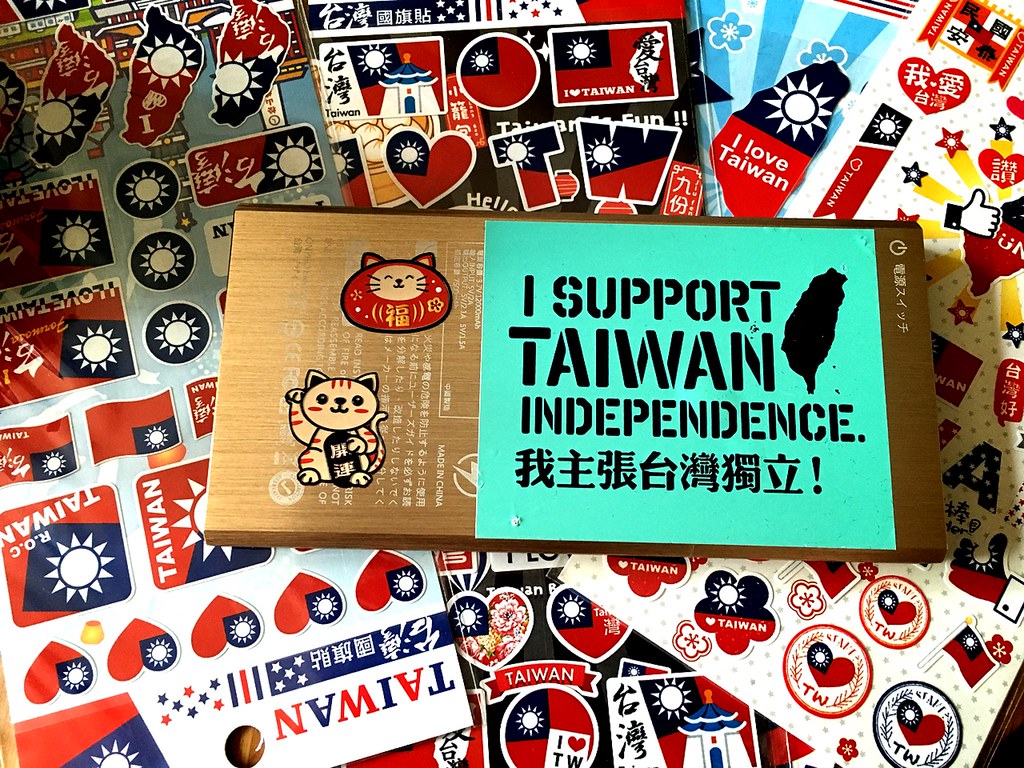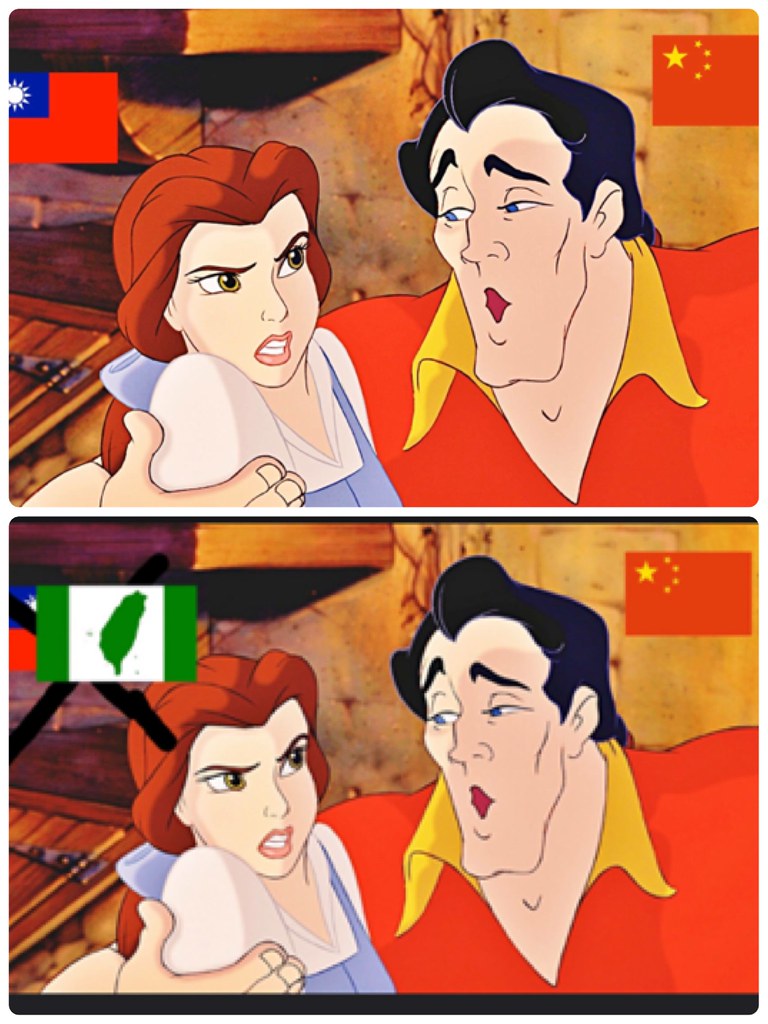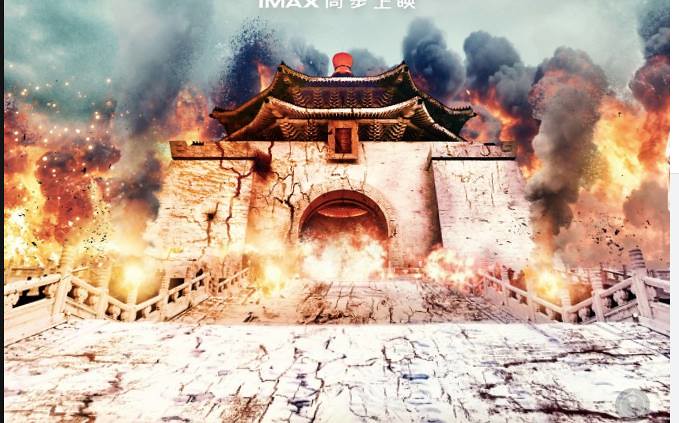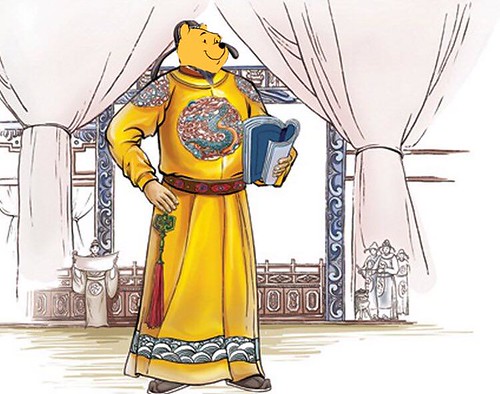 |
| Come on, give Taiwan a chance. |
A truly excellent piece of writing and overall backgrounder on Taiwan and why the Western left should care about it appeared in Dissent Magazine recently.
I'm elated. I have nothing bad to say about the piece. My only disappointment is that not enough mainstream Western lefties read Dissent, and its online access is blocked by a paywall (frankly, the reason for the former is certainly, in part, the latter). So a lot of people who should read this piece, won't.
Because you probably don't have access to read the full article, and I do (don't ask how, but I have my sorceress ways), I'm basically going to quote relevant bits here without going full-on copyright infringement, and hope that this will make the ideas therein a bit more accessible to those who so desperately need to hear them.
Here's how it starts:
Imagine a small, peaceful, progressive island in Asia about the size of Mary- land. Ruled until the Cold War’s very end by a military dictatorship, it is now a robust democracy, although it endures incessant hostility from its giant neighbor. Its people treasure their hard-fought equality, free press, and vibrant civil society.
The rest of the introduction is free to read, so I'll be taking the rest from the parts that are not accessible to non-subscribers. In any case, this is the country I call home. And, with some exceptions, it basically lives up to this promise as well as any democratic nation can.
Boasting the world’s largest standing army and an expansionist outlook, the People’s Republic of China deems Taiwan a “renegade province” that must be “reunified” in due course. And because the Chinese claim the island as part of their territory, they go out of their way to block its international participation. Essentially, they have made befriending Taiwan a zero-sum game for anyone who dares to do so, and the rules are simple: Engage with us and we will reward you; engage with them and we will punish you. It is fierce dollar diplomacy Beijing insists on waging, and Taipei can’t win.
Exactly, and thank you to this writer for putting "renegade province" and "reunified" in the scare quotes they always needed. Why can't mainstream media outlets do that? It's simple, easy and more accurate than what they do print (which is similar copy without the quotation marks, implying the claims have merit.) That the West doesn't see the game China is playing here, or doesn't care and is willing to sacrifice 23.5 million people who currently live free is terrifying to me. If you say you have values, live up to them, damn it.
In a recent poll that asked whether unification is an option if China democratizes (itself a long shot), just 24 percent of respondents aged thirty-nine or below said yes, while 73 percent said no. Since 2009, according to another survey, a majority of the island’s population has consistently self-identified as taiwanese— not as Chinese, nor as both—a sign that they have long assumed their de facto independence.
Yup. This idea that "both sides of the Strait" think of themselves or identify as "Chinese" is basically complete trash-in-the-dumpster bollocks. It's not true and hasn't been true for some time. Why the rest of the world is willing to force an identity on Taiwan - "but they're officially the Republic of China so they think they are Chinese too!", which is an oversimplification that leads to a dead-wrong conclusion - is beyond me. Everyone else gets to identify as they wish with liberal support - why not Taiwanese?
Keep in mind that Taiwan cannot change its official name from the Republic of China because doing so would precipitate a war that nobody wants, especially not the Taiwanese who, above all else, want peace. It wasn't a country name chosen by the Taiwanese - it was decided by the Nationalist government in China, without ever asking any Taiwanese what they thought about it. In essence, it is colonial. So it's a bit of a jerk's game of Catch-22 to then say this attempt to maintain peace means they "are Chinese".
As a diverse, tolerant country with a leader who has shattered the ultimate glass ceiling for Asian women, there is every reason to expect that tai- wan’s most faithful allies in the U.S. are on the left. Except that is not the case at all: American progressives tend to view it as either a reactionary state or one of no importance.
I think I need to change my pants.
This is so true it hurts, and what is worse, it's so painfully wrong. It calls to mind, forcefully, a "conversation" (more like an ignorant rant-fest on his part that I very much wanted to end) between a friend-of-a-friend on social media, in which he went on and on (and on and on), basically Dunning-Krugering himself into a tizzy about how it would be "better" and we should "hope" that Taiwan takes over China, because apparently this worked in Hong Kong (I don't think he's ever asked any Hong Kongers what they think about that, or read about how that's actually gone down, because that's not the answer I think many would give) and anyway, they're the same people with the same culture and history, so why not?
That 23.5 million people don't think they are the same people with the same culture and history, and who have already built the sort of democracy with a healthy respect for civil society that Western liberals can only wet dream about (just try occupying Congress in the United States - you'd be dead), didn't seem to factor in.
John Bolton, who would later become Trump’s national security advisor, electrified conservatives when he declared on Fox & Friends: “Nobody in Beijing gets to dictate who we talk to.”
But then came the partisan backlash. It just so perfectly fit the anti- trump narrative: a buffoon elected president who was already, before taking office, eroding well-established “norms” because he was either too reckless or too ignorant. “that’s how wars start,” tweeted Senator Chris Murphy. trump’s “flippant calls” were “threatening to create diplomatic crises,” Vanity Fair asserted in the same article that compared tsai with other controversial world leaders with whom trump had also spoken, like Rodrigo Duterte of the Philippines and Nursultan Nazarbayev of Kazakhstan, as if she, too, was a notorious human rights abuser.
Somebody please get me a towel, because it's getting hot in here.
Anyway, yeah, all this. Tsai is a moderate - if anything, too careful and too conservative - democratically-elected leader. Like all elected leaders, she is imperfect, but damn, she ain't Duterte. Likewise, Taiwan's democracy is imperfect. Some people who ought to be protected, aren't. But it ain't Turkey.
This echoes what the rest of the world writes about Taiwan and China - as though Tsai were somehow the one "causing tensions", or her fairly mild "we won't take any crap from China but we won't make waves either" stance (exactly the right attitude to take when facing a bully) was some sort of "hardliner" rant.
But since Horrible Death Walrus John Bolton said it - despite the fact that this one (and only) time, he was right - the left flipped the hell out.
And I thought our side was better at evaluating the merit of the idea rather than dismissing it based on its source. Hmm. Maybe we're not as smart as I thought.
Absent from the mainstream media discourse were the views of ordinary taiwanese, most of whom do not remotely share trump’s politics but were delighted to learn of their country’s long overdue acceptance and validation on the international stage. One commentator called it “the happiest thing” for Taiwan since the Jimmy Carter years.
HOO BOY HOSE ME DOWN.
Seriously, we have been trying to tell the West this for years. Why is it that the views of China and the CCP are always given center stage in the media and general pundit commentariat, and nobody ever seems to ask what the Taiwanese think about all this?
The article goes on to reflect on some of the ideas of this piece, which you should also read.
So, as late as the waning days of 1986, this was the scenario Washington faced: neither side could accept coexistence as they each claimed to be the sole, rightful owner of China and Taiwan combined. to keep gambling on Beijing—which first began with Richard Nixon’s famous visit in 1972 and formalized when Carter severed diplomatic ties in 1979 with Taipei—seemed sensible enough.
It was not at all imaginable that Taiwan would be the one to emerge as Asia’s beacon of freedom so soon while China would backslide.
Exactly. In 1979 the Western reaction to Taiwan made more sense - Taiwan was still a dictatorship, ruled by people not from Taiwan, who never asked the Taiwan if they wanted to be ruled. You know, like a colony.
And yeah, that dictatorship (which, again, was not Taiwanese) claimed to be the sole legitimate government of China. That sucks, but it's not Taiwan's fault and certainly doesn't reflect the views of the Taiwanese today. These guys did not even come from Taiwan and their dictatorship is over (though the party still, unfortunately, exists).
The idea that the legitimate government of China is currently in Taiwan is ludicrous, and almost all Taiwanese would agree with this. Those that don't tend to be in their 90s and were not born in Taiwan. And sure, maybe it's too bad that Grandpa lost the war, but things have changed.
So why doesn't the West get this too? Because, like, hey libs. It's not 1979 anymore. The king is dead! Long live the democratically elected leader of one of the freest countries in Asia!
There's a bit more history there, but I'm getting a little quote-happy. Just be aware that it was the 90s, and the first George Bush's actions after Tiananmen Square, that led to neo-conservatives taking up the cause of Taiwan (called the "Blue Team" - though Taiwan isn't exactly 'blue' anymore, it was then). Of course, what neo-cons champion, those liberals - well, the ones who don't think or don't know better - reflexively hate. Cue Clinton's tepid views on Taiwan, which set the stage for a general liberal ignoring of a quickly democratizing and liberalizing nation.
Some more recent history for you:
Simultaneously in Washington, the Blue team became ever more influential with Congress, think tanks, and even the incoming president’s inner circle. But while George W. Bush and his neoconservative allies were keen to confront Beijing early in his first term, they soon found themselves need- ing crucial Chinese cooperation in North Korea and especially the Middle East after 9/11; this compelled Bush to speak out against taiwanese independence in December 2003. the “One China” policy hence survived as a cornerstone of American foreign policy. Obama’s “pivot to Asia” did not alter that either, as he kept Taiwan out of the Trans-Pacific Partnership negotiations, although the free-trade pact was itself designed to counterbalance China’s regional clout.
You may hate the TPP, but if its more noble goals were ever achievable, it was just stupid to leave Taiwan out. A sign of liberal shortsightedness.
Today in Ttrump’s America, the staunchest supporters of Taiwan have been the same band of Republican hawks, from heavyweights such as Bob Dole and the late John McCain to Senators Marco Rubio and Ted Cruz, who are descendants of the Blue team. Because of this interconnection, the issue continues to be perceived as a right-wing cause with which progressives are reluctant to be associated.
Weeeeeelllll...here's where I begin to disagree. Pro-Taiwan lobbying groups and associations talk to Republicans and Lizard People like Ted Cruz because they have power now, and they'll take whatever help they can get (you may not like that, but it is a pragmatic approach. Yeah, it makes my skin crawl too. I know.)
But pro-Taiwan bills have recently had unanimous support, and Taiwan generally does have bipartisan support. As for why the left doesn't speak out for Taiwan as much as the right, I have no idea. I suspect it's because they're not as smart as they think they are, and as smart as I always wanted them to be that they don't see a natural ally in Asia staring them right in the face. A shame. Taiwan is super hawt and needn't be the nerdy virgin in this story, hoping to get the guy.
The rejection of Chiang’s memory reflects an undeniable reality: the old assumption that both Taiwan and China long to unite as one nation-state but disagree on which regime has legitimacy is simply not accurate any- more. Beijing’s failure to uphold the promise of autonomy in Hong Kong and Macau only makes unification with Taiwan even more far-fetched. For Americans in this day and age to still defend Kissinger’s “One China” policy—a shameful, self-serving lie to please the Chinese—is to pretend otherwise; the passive strategy aims to do the bare minimum to maintain the status quo, a status quo that is inherently unjust.
If you take one thing away from my quote-fest here, liberals, let it be that. And this:
It is high time for the political left to rethink taiwan. Progressives’ silence—whether because they are oblivious to the island’s changing politi- cal landscape or disinclined to anger Beijing—does a grave disservice to the taiwanese people who have come such a long way.
I SCREAM THIS AT PEOPLE IN MY DREAMS.
But where the island struggles most has always been on the world stage. When the SARS epidemic was killing hundreds of victims in neigh- boring Hong Kong and China back in 2003, Taiwanese epidemiologists had to combat the disease alone after the WHO denied them access to samples and information. Few things have changed over the years. the International Olympic Committee returned a verdict this May that forced Team Taiwan to keep playing under the awkward “Chinese Taipei” designation in the forth- coming Tokyo 2020 Games. Even with the deck stacked against it, however, Taiwan has not stopped fighting for respect and recognition.
The island merits them; it has never exploited its diplomatic alienation to act out. Rather, it has proven time and again to be a responsible, if minor, power. At a time when many Western countries are turning inward, Tsai has called immigrants “an infusion of new strength and a force for cultural diversity.”
Well, I'd like to see all those nice words on immigration translate into a shot at dual nationality without having to fit into some Special Magic Foreigner box, but cool. Some laws have been relaxed, and I appreciate that. I think she means what she says, and I think the generally pan-green or anti-KMT/pro-Taiwan side finally believes this while fighting conservatives in their ranks.
In any case, when it comes to Taiwan, this is dead on. Taiwan has done nothing to make waves - if anything, it accepts more humiliation than it ought to (it shouldn't have to accept any) to keep the peace. It has been nothing but stable and calm in the face of an increasingly screamy, angry, irrational China.
And yet, Taiwan is painted as the bad guy - raising "tensions", full of "hardliners", who need to make "concessions" because what China thinks about Taiwan is apparently more important than what Taiwan thinks about itself.
Let's bring it home with a hit right to the liberal sweet spot:
If the American left is serious about opposing a reactionary foreign pol- icy that preserves unequal power relations, it should speak up for Taiwan. Its enlightened views on gender, ethnicity, and class have translated into a social structure that’s reminiscent, in certain ways, of Northern Europe’s. Its capability and readiness to tackle the greatest challenges of our time, from terrorism to climate change, make it a well-deserved member of the international community. Its unlikely historical trajectory shows that bringing genuine progress to a part of the world where individual liberties are more often threatened than cherished is possible.
OH YEAH.
HOO BOY HOSE ME DOWN.
Seriously, we have been trying to tell the West this for years. Why is it that the views of China and the CCP are always given center stage in the media and general pundit commentariat, and nobody ever seems to ask what the Taiwanese think about all this?
The article goes on to reflect on some of the ideas of this piece, which you should also read.
So, as late as the waning days of 1986, this was the scenario Washington faced: neither side could accept coexistence as they each claimed to be the sole, rightful owner of China and Taiwan combined. to keep gambling on Beijing—which first began with Richard Nixon’s famous visit in 1972 and formalized when Carter severed diplomatic ties in 1979 with Taipei—seemed sensible enough.
It was not at all imaginable that Taiwan would be the one to emerge as Asia’s beacon of freedom so soon while China would backslide.
Exactly. In 1979 the Western reaction to Taiwan made more sense - Taiwan was still a dictatorship, ruled by people not from Taiwan, who never asked the Taiwan if they wanted to be ruled. You know, like a colony.
And yeah, that dictatorship (which, again, was not Taiwanese) claimed to be the sole legitimate government of China. That sucks, but it's not Taiwan's fault and certainly doesn't reflect the views of the Taiwanese today. These guys did not even come from Taiwan and their dictatorship is over (though the party still, unfortunately, exists).
The idea that the legitimate government of China is currently in Taiwan is ludicrous, and almost all Taiwanese would agree with this. Those that don't tend to be in their 90s and were not born in Taiwan. And sure, maybe it's too bad that Grandpa lost the war, but things have changed.
So why doesn't the West get this too? Because, like, hey libs. It's not 1979 anymore. The king is dead! Long live the democratically elected leader of one of the freest countries in Asia!
There's a bit more history there, but I'm getting a little quote-happy. Just be aware that it was the 90s, and the first George Bush's actions after Tiananmen Square, that led to neo-conservatives taking up the cause of Taiwan (called the "Blue Team" - though Taiwan isn't exactly 'blue' anymore, it was then). Of course, what neo-cons champion, those liberals - well, the ones who don't think or don't know better - reflexively hate. Cue Clinton's tepid views on Taiwan, which set the stage for a general liberal ignoring of a quickly democratizing and liberalizing nation.
Some more recent history for you:
Simultaneously in Washington, the Blue team became ever more influential with Congress, think tanks, and even the incoming president’s inner circle. But while George W. Bush and his neoconservative allies were keen to confront Beijing early in his first term, they soon found themselves need- ing crucial Chinese cooperation in North Korea and especially the Middle East after 9/11; this compelled Bush to speak out against taiwanese independence in December 2003. the “One China” policy hence survived as a cornerstone of American foreign policy. Obama’s “pivot to Asia” did not alter that either, as he kept Taiwan out of the Trans-Pacific Partnership negotiations, although the free-trade pact was itself designed to counterbalance China’s regional clout.
You may hate the TPP, but if its more noble goals were ever achievable, it was just stupid to leave Taiwan out. A sign of liberal shortsightedness.
Today in Ttrump’s America, the staunchest supporters of Taiwan have been the same band of Republican hawks, from heavyweights such as Bob Dole and the late John McCain to Senators Marco Rubio and Ted Cruz, who are descendants of the Blue team. Because of this interconnection, the issue continues to be perceived as a right-wing cause with which progressives are reluctant to be associated.
Weeeeeelllll...here's where I begin to disagree. Pro-Taiwan lobbying groups and associations talk to Republicans and Lizard People like Ted Cruz because they have power now, and they'll take whatever help they can get (you may not like that, but it is a pragmatic approach. Yeah, it makes my skin crawl too. I know.)
But pro-Taiwan bills have recently had unanimous support, and Taiwan generally does have bipartisan support. As for why the left doesn't speak out for Taiwan as much as the right, I have no idea. I suspect it's because they're not as smart as they think they are, and as smart as I always wanted them to be that they don't see a natural ally in Asia staring them right in the face. A shame. Taiwan is super hawt and needn't be the nerdy virgin in this story, hoping to get the guy.
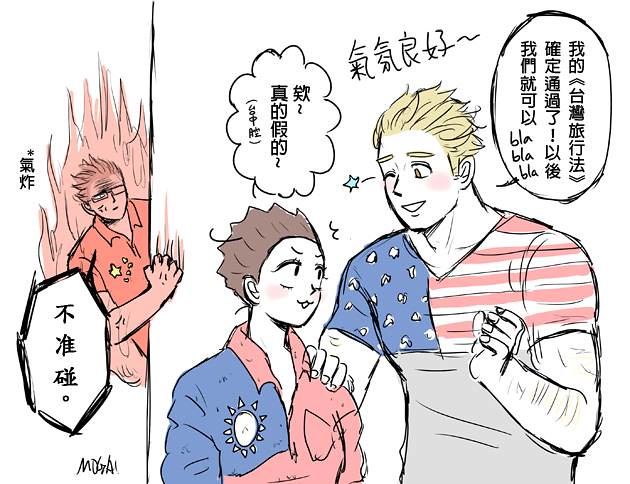 |
| The Guy (from here - I've talked to them about permission to post their work generally - they are great and you should check them out) |
The rejection of Chiang’s memory reflects an undeniable reality: the old assumption that both Taiwan and China long to unite as one nation-state but disagree on which regime has legitimacy is simply not accurate any- more. Beijing’s failure to uphold the promise of autonomy in Hong Kong and Macau only makes unification with Taiwan even more far-fetched. For Americans in this day and age to still defend Kissinger’s “One China” policy—a shameful, self-serving lie to please the Chinese—is to pretend otherwise; the passive strategy aims to do the bare minimum to maintain the status quo, a status quo that is inherently unjust.
If you take one thing away from my quote-fest here, liberals, let it be that. And this:
It is high time for the political left to rethink taiwan. Progressives’ silence—whether because they are oblivious to the island’s changing politi- cal landscape or disinclined to anger Beijing—does a grave disservice to the taiwanese people who have come such a long way.
I SCREAM THIS AT PEOPLE IN MY DREAMS.
But where the island struggles most has always been on the world stage. When the SARS epidemic was killing hundreds of victims in neigh- boring Hong Kong and China back in 2003, Taiwanese epidemiologists had to combat the disease alone after the WHO denied them access to samples and information. Few things have changed over the years. the International Olympic Committee returned a verdict this May that forced Team Taiwan to keep playing under the awkward “Chinese Taipei” designation in the forth- coming Tokyo 2020 Games. Even with the deck stacked against it, however, Taiwan has not stopped fighting for respect and recognition.
The island merits them; it has never exploited its diplomatic alienation to act out. Rather, it has proven time and again to be a responsible, if minor, power. At a time when many Western countries are turning inward, Tsai has called immigrants “an infusion of new strength and a force for cultural diversity.”
Well, I'd like to see all those nice words on immigration translate into a shot at dual nationality without having to fit into some Special Magic Foreigner box, but cool. Some laws have been relaxed, and I appreciate that. I think she means what she says, and I think the generally pan-green or anti-KMT/pro-Taiwan side finally believes this while fighting conservatives in their ranks.
In any case, when it comes to Taiwan, this is dead on. Taiwan has done nothing to make waves - if anything, it accepts more humiliation than it ought to (it shouldn't have to accept any) to keep the peace. It has been nothing but stable and calm in the face of an increasingly screamy, angry, irrational China.
And yet, Taiwan is painted as the bad guy - raising "tensions", full of "hardliners", who need to make "concessions" because what China thinks about Taiwan is apparently more important than what Taiwan thinks about itself.
Let's bring it home with a hit right to the liberal sweet spot:
If the American left is serious about opposing a reactionary foreign pol- icy that preserves unequal power relations, it should speak up for Taiwan. Its enlightened views on gender, ethnicity, and class have translated into a social structure that’s reminiscent, in certain ways, of Northern Europe’s. Its capability and readiness to tackle the greatest challenges of our time, from terrorism to climate change, make it a well-deserved member of the international community. Its unlikely historical trajectory shows that bringing genuine progress to a part of the world where individual liberties are more often threatened than cherished is possible.
OH YEAH.



